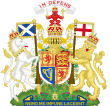Keeper of the Signet
| Lord Clerk Register | |
|---|---|

Royal Coat of Arms of the United Kingdom in Scotland
|
|
| Appointer | Monarch of the United Kingdom |
| Salary | none |
The office of Lord Clerk Register is the oldest surviving Great Officer of State in Scotland, with origins in the 13th century.
The Clerk-Register was from ancient times the principal Clerk in the kingdom, from whom all other clerks, whatever their government positions, and who were essentially his deputies, derived their immediate authority. He acted also as Clerk to the parliament and Privy Council, where in the old registers and proceedings of parliament he is referred to as Clericus Rotulorum, because the ancient scripts were in rolls of paper (as opposed to codices). These later became termed Rotuli parliamenti, the rolls of court, but were thereafter ordered to be made up into Register books and the respective clerks instructed to transmit those books to the Clerk-Register to be preserved by him in the public archives.
The Treaty of Union in 1707 provided for the preservation of public records; and the election and management thereof of the sixteen Scottish peers to the House of Lords in the new British parliament was ordered by the Lord Clerk-register, with two Clerks of Session commissioned by him to assist.
The office formerly had other functions also: as well as the responsibility for public registers and records, the Clerk-register was a Commissioner for the Regalia and Keeper of the Signet. Only these last two functions remain and the office is now largely ceremonial in nature and carries no salary or special privileges.
The Lord Clerk Register (Scotland) Act 1879 provided that the Lord Clerk Register should continue as an Officer of State, but all his rights and duties with regard to the preservation of the public registers and records were transferred to the Deputy Clerk Register (now the Keeper of the Records of Scotland). The Lord Clerk Register remained responsible for the election of representative peers of Scotland until these were abolished in 1963.
...
Wikipedia
